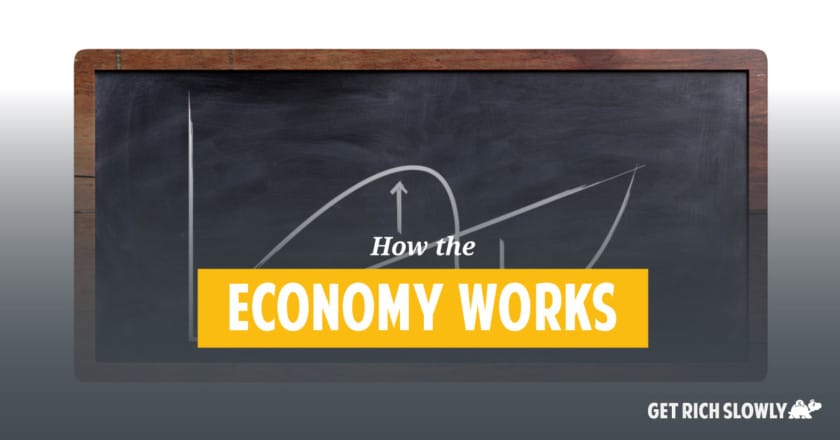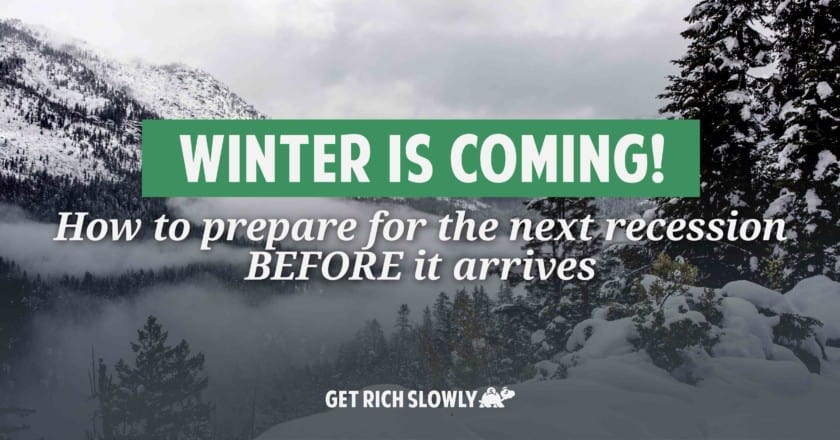What is the average rate of return on stocks?

One of the fundamental ideas I try to promote here at Get Rich Slowly is your savings ought to be invested for long-term growth. You ought to use the magic of compounding to create a wealth snowball.
Naturally, you want put your money into an investment that offers a reasonable return and acceptable risk. But which investment is best? I believe -- as do most financial experts -- that you're most likely to achieve high returns by investing in the stock market.
But why do so many people favor the stock market? How much does the stock market actually return? Is it really better than investing in real estate? Or Bitcoin? Let's take a look.
How the economy works

It's time for another episode of Get Rich Slowly Theater, boys and girls! This week, we're going to enjoy a thirty-minute YouTube video exploring how the economy works. Think of it as Economics 101, but instead of a semester spent sitting in a classroom, you get all of the info in the time it would take you to watch an episode of Big Bang Theory.
Here's the video:
https://www.youtube.com/watch?v=PHe0bXAIuk0
Thoughts on systemic poverty, fault, and responsibility
I write a lot at Get Rich Slowly about habits that foster wealth and success.
Like it or not, there are very real differences between the behaviors and attitudes of those who have money and those who don't. This isn't me being classist or racist. It's a fact. And I think that if we want ourselves and others to be able to enjoy economic mobility, to escape poverty and dire circumstances, we have to have an understanding of the necessary mental shifts.
The problem, of course, is that it's one thing to understand intellectually that wealthy people and poor people have different mindsets, but it's another thing entirely to be able to adopt more productive attitudes in your own life.
How the things we own vary at different levels of net worth
Do people at different levels of wealth spend their money on different things? Of course they do.
Some of these differences are by necessity, of course. If you have a million dollars in net worth, for example, then even average spending on your weekly meals will make up a much smaller portion of your net worth than the same spending would for somebody who has a net worth of $10,000.
(To put it another way: If you have two families that both spend $100 per week on food, but one family has a net worth of $1,000,000 and the other family has a net worth of $10,000, then the wealthier family spends less than one-tenth of one percent of its wealth each week on food while the poorer family spends one percent of its wealth.)
Winter is coming! How to prepare for the next recession BEFORE it arrives

Yesterday I wrote about why it's important to prepare for an uncertain future. It's tough to predict where we'll be (and who we'll be) in five or ten years. It's even tougher to predict what's going to happen in the world around us. In order to cope with this uncertainty, it's important to be adaptable -- and to prepare for the worst (while expecting the best).
I was reminded of this advice again this morning as I read several articles in a row about the insane rise of Bitcoin and the current bull market in stocks, which is one of the longest in U.S. history.
Here's a graph of the rise of the S&P 500:
What was life like during the Great Depression?

Since the Great Recession of 2008 and 2009, there have been a lot of news stories about how awful everything is. Never mind that most Americans enjoy the best standard of living of any culture in history, people still find things to complain about. Perhaps this is because people lack perspective. They don't realize what life was like in the past or what real hardship is.
The always-excellent Reading Through History channel on YouTube has a seven-minute video that takes us on a tour of what like was like for the typical American family during the Great Depression.
https://www.youtube.com/watch?v=gkAfjRolNCI
The four seasons: A new way to look at the U.S. economy
Other than when the stock market crashes or another ten thousand people get pink slips, you never hardly hear anyone mention the economy, do you? Most people (you, perhaps?) view the economy as some external force over which nobody has any control. You feel like a victim of this capricious force and you can "only hope for the best".
Wrong on both counts.
The economy "happens" whether the news mentions it or not. No, it's not capricious. And no, you needn't be a victim.
How to profit from economic cycles
(Since April is Financial Literacy Month, a number of articles will be devoted to more educational topics. This is Part IV in a four-part series about how understanding economic cycles could inform your financial decisions. Part I is Understanding economic cycles: An introduction. Part II is Recognizing economic seasons: recovery and growth. Part III is The fall and winter seasons of the economic cycle.)
In the first three parts of this series, you saw how the economy moves in cycles of seven to 10 years, and how each cycle can be broken down into four phases which correspond closely to the seasons of nature. We also looked at some of the telltale signs of economic activity that can help us recognize where we are in the cycle.
You may be thinking, "That's all interesting, but how can I apply that knowledge to my personal financial life?" Let's start by decapitating the elephant in the room -- market-timing. Market-timing is a fool's game. However, most of the time market-timing refers to trying to find the high point in the market to sell high. It is true: Nobody is able to tell when a market has reached its peak.
The fall and winter seasons of the economic cycle
(This is Part III in a four-part series about how understanding economic cycles could inform your financial decisions. Part I is Understanding economic cycles: An introduction. Part II is Recognizing economic seasons: recovery and growth. Part IV is How to profit from economic cycles.)
You will recall from Part II of this short series about economic seasons that the spring of early recovery and the summer growth season resemble the corresponding seasons in nature fairly closely. In this post, we will look at the other two seasons of the economy: fall and winter.
But before we do, it is important to keep in mind that, though the seasons in nature change every three months, the seasons of an economic cycle do not have a fixed length. In terms of economic cycles, a season can last years; and it is difficult to set a calendar to know when the season changes.
As in nature, we have two change seasons (spring and fall) and two main seasons (summer and winter). Last time we looked at one of each. Here are the other two.
Recognizing economic seasons: Recovery and growth
(Since April is Financial Literacy Month, a number of articles will be devoted to more educational topics. This is Part II in a four-part series about how understanding economic cycles could inform your financial decisions. Part I is Understanding economic cycles: An introduction. Part III is The fall and winter seasons of the economic cycle. Part IV is How to profit from economic cycles.)
In Part I of this series, the introductory post about economic cycles, we discussed the fact that the economy, while growing over the long term, moves in up-and-down cycles and that each cycle can be broken down into four phases that mirror the four seasons of nature. In this section, we will explore what we identified as the spring and summer seasons of the economic cycle by considering two fictional crop farmers (Farmer Fred and Farmer Claude) whose livelihoods depend on how well they manage their work each season.
Farmer Fred is a successful farmer; but his neighbor, Claude, less so. (We'll just call him Farmer Clod.) But let's dive into the seasons and see what each does that causes them to be successful or not. Nature programs always begin with the newness of spring, so why don't we start there?